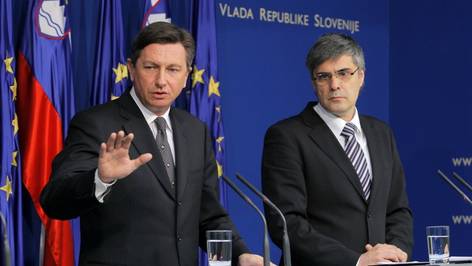NEWS
Prime Minister Borut Pahor on the reform of the health system: “Modern Slovenia cannot afford to have an outdated health system.”
At a press conference today, the Prime Minister of the Republic of Slovenia, Borut Pahor, and the Minister of Health, Dorijan Marušič, presented a proposal to upgrade the health system by 2020; the proposal is based on draft laws on health services, health care and health insurance, which have so far been coordinated by the coalition. Prime Minister Borut Pahor stressed that Slovenia needed a reform of the health system, since, without modernisation, it would not be able to take its place among the most developed countries in the long run. “The new dynamic balance calls for a move forward towards achieving our goal in terms of competitiveness and solidarity of helping all the citizens who do their share in financing the health care system to be better off. Our health system should be such that it would benefit not only a handful of rich people, but also the vast majority of our citizens, since Slovenia is, and will continue to be, a welfare state.”
The top priority in this, said Mr Pahor, is to set up a health system that would, first and foremost, cater for the needs of its users, while ensuring financial sustainability, and have a competitive edge within the European area. Aware of the urgent need to address the new reality brought about by the crisis, the Government has had to swallow a bitter pill and deal with the situation without hesitation, a move which is unlikely to boost its popularity: “Our goal is to achieve the well-being of our citizens and ensure a high-quality health system." He nonetheless hoped to see the proposals and critical views expressed in public debate pursue an ambition to put in place these reforms within the set timeline by the end of this year.
Prime Minister Pahor further reported that all the coalition partners agreed that maintaining the status quo on health care would only lead to an even more rigid health system, unresponsive to the needs of the citizens: “Since we took office, we have pursued a clear plan, even though we knew that, by so doing, we would challenge the traditional views on the health system. And indeed, that is why we should pursue social dialogue to clarify and overcome these reservations.” He added that, in this regard, his choice of a new minister was vital to success, given that the agreement between him and the new minister is based on preparing a well thought out upgrade to the health system by 2020. “Modern Slovenia cannot afford to have an outdated health system that has lost its competitive edge in the European area,” stressed the Prime Minister, announcing that the above-mentioned document is to be submitted for public debate, and is scheduled for discussion at the Government’s session to be held on 17 February 2011. The public debate is expected to end in mid-March, and two new laws are scheduled for adoption at government level by the start of the summer holidays, and will then be submitted to the National Assembly for consideration.
At a press conference, Mr Marušič noted that it had taken a long time to draw up these proposals, which are the result of determined and concerted efforts by ministry experts and external experts alike. They have worked together to provide the right solution that would help modernise the health system, making it more flexible and accessible according to geographical, financial and quality criteria. “Our aim is to establish effective regional centres of knowledge that would maintain the highest quality of the health system, reaching the European level,” said Mr Marušič, adding that, to that end, they have focused on how best to respond to the needs of the citizens, while bearing in mind that it is in the common interest that health is the highest priority of all the citizens.




